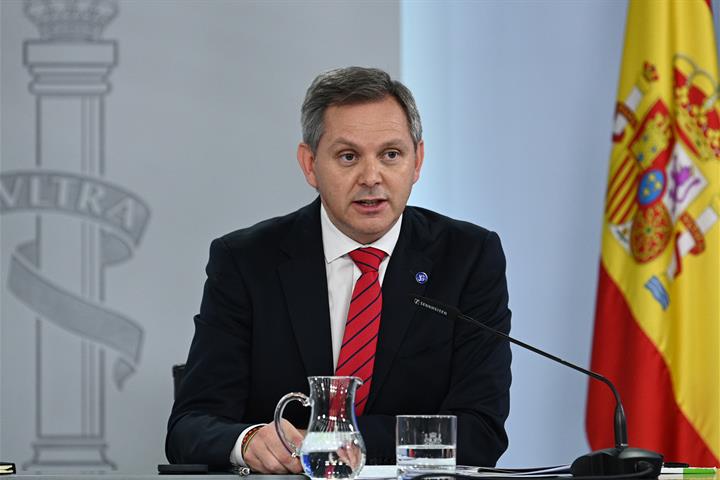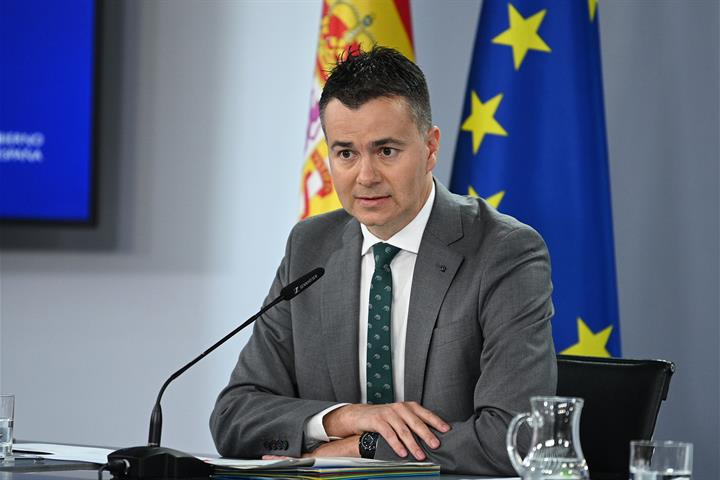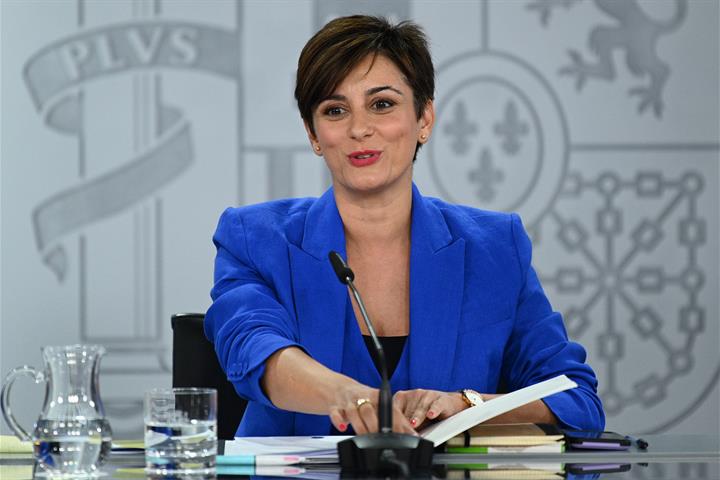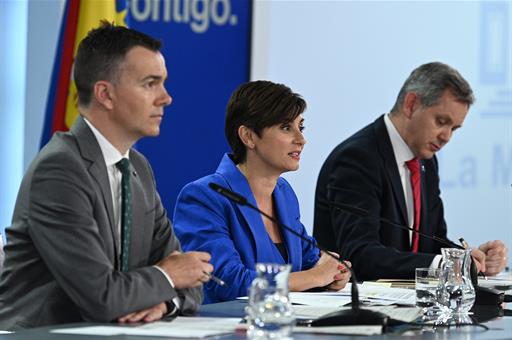Council of Ministers
The Council of Ministers declares the end of the COVID-19 health crisis and removes the obligation to wear face masks
Council of Ministers - 2023.7.4
Moncloa Palace, Madrid
Three years after the start of the COVID-19 pandemic, the Council of Ministers has declared the end of the health crisis and the extraordinary measures agreed to address this emergency situation. The obligatory use of masks is therefore eliminated in the areas where it was still required. The measure will enter into force as soon as the agreement is published in the Official State Gazette (BOE).
The Minister for Health, José Miñones, has highlighted the health, economic and social measures adopted by the government since the World Health Organisation (WHO) warned on 11 March 2020 that the emergency caused by COVID-19 was a global pandemic. He also praised the work of scientists and technicians, both health and non-health professionals, the public and the media, and remembered the victims and their families.
Miñones pointed out that the start of the vaccination marked "a turning point" in the pandemic. In Spain, 93% of the population has nowadays received a full dose following the administration of more than 105 million vaccines. "Our message must be clear: vaccines save lives," said the Minister for Health, who defended Spain's vaccination strategy as an international benchmark. Spain is also among the top five donors of vaccines to other countries. As proof that this commitment is still valid, the minister announced that one of the first initiatives of the Spanish presidency of the Council of the EU will be a technical meeting on vaccination on 18 July.
Recommended use of masks
 The Minister for Health, José Miñones, during his speech at the press conference after the Council of Ministers | Pool Moncloa/Borja Puig de la Bellacasa
The Minister for Health, José Miñones, during his speech at the press conference after the Council of Ministers | Pool Moncloa/Borja Puig de la Bellacasa
Miñones explained that the epidemiological situation of COVID-19 has been balancing out since November 2022, and even shows signs of a decreasing trend in both the number of deaths and hospitalisations. The number of hospital beds occupied by these patients is less than 1%, and their presence in Intensive Care Units (ICU) has also been considerably reduced.
These data, together with the lower virulence of the current variant of the coronavirus and the higher percentages of immunity and vaccination, lead to the conclusion that the disease no longer constitutes a health crisis situation in Spain, which is in line with what the WHO Emergency Committee determined on 5 May, and also with the position of the experts of the Centre for the Coordination of Alerts and Health Emergencies (CAES). All the autonomous communities also agreed to end the crisis at the Interterritorial Council of 23 June.
The Minister for Health stressed the importance of maintaining the "culture of responsibility" acquired over the years: "The use of face masks, as well as other hygienic measures that were put in place, must continue to be present in our lives on a daily basis for all those who have symptoms of respiratory infection". The experts' recommendations focus on healthcare centres and on the need to reinforce the use of masks by symptomatic people when they are in shared spaces, by professionals caring for symptomatic cases and by people working in ICUs and in units with vulnerable patients.
Support for the electro-intensive industry, entrepreneurs and SMEs
The Council of Ministers has earmarked €86 million for subsidies for electro-intensive companies.
The Minister for Industry, Trade and Tourism, Héctor Gómez, recalled that the government recently modified the Statute for Electro-intensive Consumers to increase the number of beneficiaries of this aid, which compensates for electricity bill charges, from 600 to 1,200. This call, he added, represents "very important" support for the country's entire productive fabric.
Also within the scope of this ministry, the executive has authorised five calls for proposals within the framework of the Recovery, Transformation and Resilience Plan for a total amount of €214 million, aimed at promoting digital transformation, growth and training for entrepreneurs, startups and SMEs.
Update of investment regulations in Spain
 The Minister for Industry, Trade and Tourism, Héctor Gómez, during his speech at the press conference after the Council of Ministers | Pool Moncloa/Borja Puig de la Bellacasa
The Minister for Industry, Trade and Tourism, Héctor Gómez, during his speech at the press conference after the Council of Ministers | Pool Moncloa/Borja Puig de la Bellacasa
The Council of Ministers has adapted the legislation on foreign investment in Spain to the legal framework of the EU, with the aim of reinforcing legal certainty and the accuracy of direct investment statistics.
The Minister for Industry, Trade and Tourism stressed that 2022 was the second best year in the historical series in terms of foreign investment in Spain, with more than €34 billion, and that the figures for the first quarter of 2023 were even better.
Boosting the electric vehicle
The Minister for Industry, Trade and Tourism also informed about the new aid for projects within the framework of the PERTE for Electric and Connected Vehicles, which are divided into two blocks.
The first, focused on battery production, will be worth €850 million, €550 million in grants and the rest in loans, with the call for proposals planned to be published in the next few days. As for the second block, this week the European Commission has published the regulation necessary to draw up the call for proposals, which will be aimed at specific projects relating to the promotion of electric vehicles.
Héctor Gómez pointed out that the government has incorporated in the addendum to the Recovery Plan a heading that will cover the third call of this PERTE. In addition to the above, the investment will exceed €3 billion. "Together with the enormous effort we are making in terms of charging points, incentives and deductions, this will mark a turning point", said the minister, who is confident that this will enable Spain to be "above the European average in terms of electric vehicle penetration".
Fighting racism and xenophobia
 The Government Spokesperson and Minister for Territorial Policy, Isabel Rodríguez, during her speech at the press conference after the Council of Ministers | Pool Moncloa/Borja Puig de la Bellacasa
The Government Spokesperson and Minister for Territorial Policy, Isabel Rodríguez, during her speech at the press conference after the Council of Ministers | Pool Moncloa/Borja Puig de la Bellacasa
The executive has approved the Strategic Framework for Citizenship and Inclusion against Racism and Xenophobia 2023-2027.
The Minister for Territorial Policy and Government Spokesperson, Isabel Rodríguez, indicated that the framework includes a series of international recommendations and commitments and responds to the agreement of the member states of the EU to have specific plans against racism. Different ministries, institutions such as the Attorney General's Office and the Ombudsman's Office, social agents and academic and civil organisations have taken part in the creation of the strategic framework.
Its two main objectives are, first, to advance the integration of migrants, and second, to prevent and combat racism, xenophobia and other forms of intolerance. The spokeswoman for the executive has outlined the usefulness of the plan in terms of responding to the increase in hate speech, especially in the Internet sphere. "Hatred does not arise by spontaneous generation: Hatred is often nurtured, and this is what we have to combat from the public administrations," he said.
Aid for thalidomide sufferers
The Council of Ministers has finalised aid for people affected by thalidomide in Spain between 1950 and 1985.
Isabel Rodríguez explained that this establishes the right to receive financial support for people who meet a series of requirements: that they suffered these bodily malformations during the gestation process, and they conform to those described for this medicine; that the gestation took place in Spain; and that the person concerned is registered in the State Register of Rare Diseases managed by the Carlos III Health Institute. In Spain, 130 people are currently registered, and another 7 are pending the resolution of their case.
The support consists of a one-off payment and varies according to the degree of disability. The deadline to apply is three months from the publication of the decree in the BOE.
Other agreements of the Council of Ministers
The executive has authorised contracts worth €244 million for the maintenance of 1,354 kilometres of roads, an investment that will complement the investment decided last week, focused on improving road safety and protecting the environment.
Furthermore, the Council of Ministers has declared the jota dance as a Representative Manifestation of Intangible Cultural Heritage. The Minister for Territorial Policy expressed the government's recognition of "the people and entities that keep this tradition alive, that pass it on from generation to generation and that, in short, through cultural heritage also give cohesion to our country, to Spain".
Non official translation





